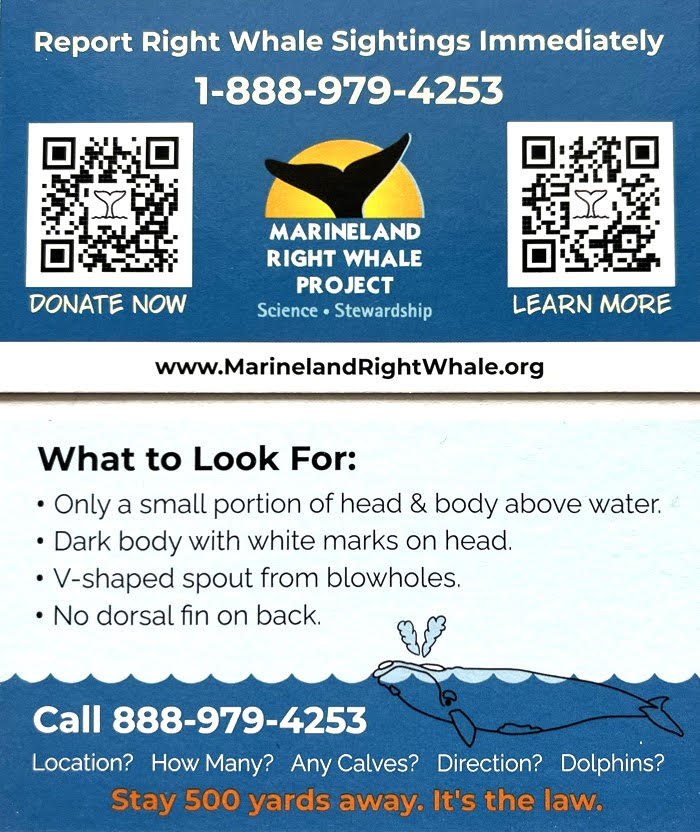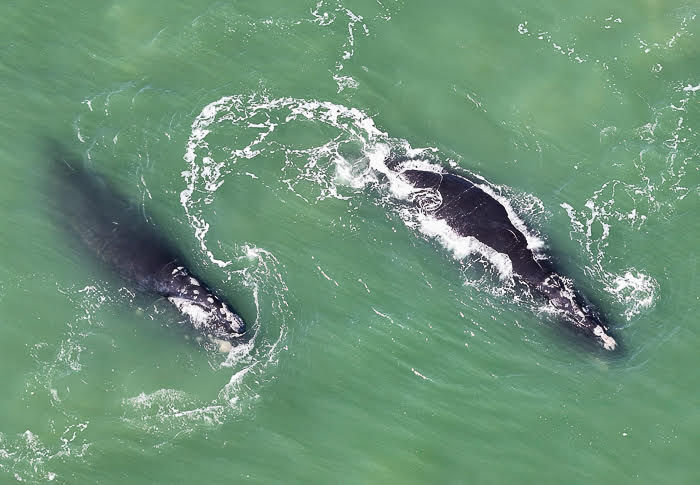It’s premature to be too jubilant. However, in the 2024-25 season there have been some advances. First, with the right whales. Ten calves were born. There were six experienced mothers and four first-time mothers. Since the average number of calves in the previous decade has been around 20, as we enter each season, we hope for a number in the 20s. But, as a reality check, for the current five-year period, the average is around 15, with—hopefully—the poor calving years of 2017 through 2019 behind us.
Second, with the program. Budget shortfalls caused us to make adjustments. Jim didn’t make the trip to Florida this year, and rather, did administrative tasks from home on Cape Cod. (This resulted in a cost savings.) As part of the adjustment, Sara was the on-site manager/coordinator. But wait, there’s more. Several volunteers (Jeff Greene, Michelle Ross, Sam Henderson, and Zoe Rauscher) joined our team of drone operators. In fact, Zoe, in her initial flights, documented a new mother-calf for the season: #3420, Platypus, a 21-year-old with her 2nd calf. Yahoo! And, our volunteer group continued to strengthen, gain experience, and make significant contributions. The Rauscher family modernized communications and broadened our reach by developing a new website (marinelandrightwhale.org) and a Facebook page. They initiated a method to accept electronic donations and payments and designed new sightings cards with two QR codes that link to our website and online donation page.
End-of-Season Meeting
Our wrap up meeting for the 2025 season was held on Saturday, 15 March. Over 100 people attended, partaking in delicious food and good conversations. As anticipated, there was vigorous competition for the high-quality raffle items; ticket sales raised just over $1,000 for the program.
To raise funds for the program, volunteers donated raffle items including five ceramic right whale pieces by local artist Sue Allen (Image: Bill Gough)
Sara gave a presentation summarizing the season, which included some very positive numbers. We had 265 active volunteers who donated some 7,000 hours to surveys. We had 265 active volunteers who donated some 7,000 hours to surveys. Far more volunteers saw whales in our survey area this season than in the past few years; some saw right whales for the first time! Collectively, our volunteers either sighted or responded to 15 right whale sightings, which included 6 of the 10 known mother-calf pairs, as well as some juveniles and adults. They also assisted with 13 sightings of humpback whales, up from only 5 in the past two years put together.
Another highlight of the meeting was Jeff Greene’s video of #3503, Caterpillar, and her calf off Flagler Beach on January 27. This can be seen on the Marineland Right Whale Project’s YouTube channel, along with our other videos.
This season’s fifteen Team Leaders were recognized for their efforts leading the volunteer surveys (Image: Merrideth Gough)
Minds of Their Own
The celebrity whales of the 2025 season were two adult females who aroused curiosity. Sixteen-year-old #3940, Koala, and #4190, 14-year-old Curlew, showed an unusual (but not unique) travel pattern. They had been seen traveling close together since late November. From the core distribution area (centered approximately on Amelia Island, Florida), the pair swam south past Miami, into the Gulf, and were sighted on 2 February in the vicinity of Mobile, Alabama. They were next sighted to the east, off Panama City, Florida. Then, in late February and early March, it looked like the pair might be making the return trip as they were heading south along the west coast of Florida. On 23 February, the pair was seen off St. Petersburg, Florida, and they were expected to round the corner and head north. But no! By early April they had reversed course and were back off the Florida panhandle. Many wondered, “Are they stuck in the Gulf? Will they ever return north?” On 11 April, they were sighted off Tampa, heading south. Could this be their return trip? Will we see them off Florida’s east coast? Their story is unfolding.
This pair of adult females, Koala and Curlew, first showed up in the Gulf in early February and were still there as of 11 April. When will they return to the northeast? (Image: Joel Cohen, BWRI, NOAA permit #26562)
Right Whale News
For all you Cetophiles out there, the March 2025 issue of Right Whale News has been posted on the website of the North Atlantic Right Whale Consortium (www.narwc.org). Biology, politics—the good and the bad—it’s all in there.
Fundraising
Support for the Marineland Right Whale Program comes from several sources, including federal government and foundations. An essential component comes from private donations. (Think of pieces of a pie.) Many thanks to those of you who have already donated this season. For those who wish to make a post-season donation, please either write a check to ASWH and mail it to Jim Hain, ASWH, PO Box 721, Woods Hole, MA 02543, or head over to our new website and click on the Donate page. Thank you in advance for helping to keep the program viable as we wrap up the 2025 season and prepare for 2026.
Looking to the 2026 Season
Given current news, we can’t help but know that we are in turbulent times. There is uncertainty. Know that we are vigorously planning for another season and the future of our successful program. Updates and assessments will be provided in the coming months. In the meantime, a huge thank you to all the volunteers who helped in the field and behind the scenes. You can feel satisfied, and cautiously optimistic.














